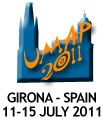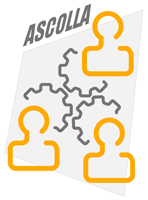The call for papers is also available for downloading in PDF format and TXT format. Paper submission is now closed.
Quick links: Motivation – Topics of Interest – Format / Submission –
Important Dates – Organizing Committee – Programme Committee – Contact
Motivation
The increasing availability of computing and communication facilities in our environment, along with the resulting ease with which tasks previously undertaken individually can now be shared, have given rise to new paradigms of collaboration that permeate many facets of human activity. Collaborative learning, co-operative knowledge discovery and maintenance, argumentative spaces, communities of practice, are only a few examples of new forms of collaboration enabled and fostered by recent technological advances. These have been trialled and explored in domains such as scientific research, medical diagnosis and trials, innovative learning environments, business analytics, and collaborative environments.
Despite the increased attention this area is receiving, research in adaptive support for collaboration is still unsystematic, and is carried out mainly on “technological terms”. Little input is received from the Social Sciences —that have a wealth of foundational wisdom to offer in terms of how groups, teams and communities collaborate—, and experiments are usually constrained to the application domain of collaborative learning. Although there exist obvious connections to issues examined in “neighbouring” research fields, such as applications of collaborative filtering, adaptive social software, etc., the requirements of adaptive support for collaboration are quite distinct and relate to the very nature of collaboration (the existence of a team as a cohesive social entity, the fact that there is often a specific set of concrete and temporally constrained goals underlying the collaboration process, the possible production and use of artefacts around which collaboration revolves, etc.)
The International Workshop on Adaptive Support for Team Collaboration (ASTC) 2011 aspires to contribute towards mitigating these problems by offering a venue for targeted discussion on adaptive support for collaboration. The workshop aims to bring together researchers from different scientific fields and research communities to exchange experiences and discuss the topic of how collaboration within teams can be supported through the employment of adaptivity that is grounded on the characteristics of the teams and their individual members, their activities (which are increasingly data-intensive and cognitively complex) and social bonds.
Topics of Interest
The workshop will be structured around a number of main questions, including:
- How can we model teams as entities with their individual and collective characteristics, social evolution, maturity, etc?
- What (types of activities) can be monitored during the collaboration process, and how can their significance be established?
- What are the types of interventions that may have a beneficial effect on collaboration?
- What are the possible roles of a system in this respect?
- What are the effects of the application domain on the collaboration process, and on the ways in which this can be supported?
- What social and group processes are important for team collaboration and how can these be supported using UMAP techniques?
The list below provides possible topics of interest of this workshop (other topics directly related to the aforementioned questions are also welcome):
- Theoretical issues on adaptation methods and techniques for groups.
- User- and Group- modeling to cater for adaptive system design.
- Adaptive and intelligent forms of tutoring/scaffolding/scripting in CSCW/CSCL systems.
- Practical approaches to adaptive collaboration support.
- Methods and tools for the design and implementation of adaptativity for collaboration.
- Formalization efforts of the adaptive collaborative learning activity.
- Interaction analysis techniques to inform the adaptable and flexible behavior of CSCW systems.
- Information extraction from large/multiple datasets to provide adaptive support for collaboration.
- Adaptive support for collaborative innovation networks.
- Methodologies & tools: mixed or new methods, approaches and tools applied to studying or building collaborative systems.
- Adaptation in data-intensive Web 2.0 / Social networking collaboration environments.
- Adaptive collaboration systems based on emerging technologies such as mobile and ubiquitous computing.
Format / Submission
The workshop will comprise a keynote speech by Prof. Gloria Mark (University of California, Irvine, USA -- more details about the talk will be announced shortly), presentations of accepted papers, and discussion among workshop participants.
We welcome original work at all stages of development: papers can describe applied systems, empirical results or theoretically grounded positions.
Submissions should be either full papers (10 pages), or short papers (5 pages). All submissions should be formatted according to the general UMAP2011 submission guidelines and must adhere to the Springer LNCS format (see the example document with author instructions). Additional submission information can be found on the submission page on this site.
Submissions will be peer reviewed by the workshop organizing committee. Accepted papers will be included in the UMAP 2011 workshop proceedings and will be published on the workshop site. The authors will deliver a presentation of the papers during the workshop.
As already mentioned, the workshop will also include a session devoted to discussion amongst the participants. The goal of this session will be to arrive at an outline of a research agenda for the field
Important Dates
| Abstract submission deadline: | 8 April 2011 |
| Paper submission deadline: | 29 April 2011 |
| Notification to authors: | 16 May 2011 |
| Camera-ready paper due: | 25 May 2011 |
Organizing Committee
Please refer to the Organization page on this site.
Programme Committee
Please refer to the Organization page on this site.
Contact
For any queries please contact the workshop’s organizers at: astc2011@gmail.com



